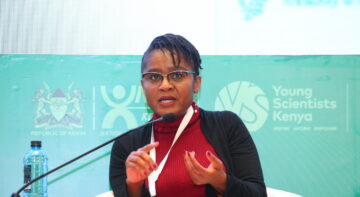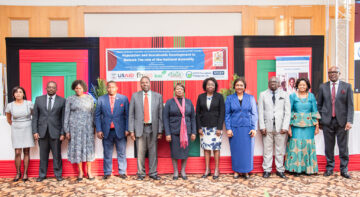News

This article was published by the Nation Malawi.
The African Institute for Development Policy (AFIDEP) is a renowned regional think-tank focusing on research and policy. It is headquartered in Nairobi, Kenya, but has footprint in many African countries, including Malawi, where it has influenced policy. Nation Malawi writer Suzgo Chitete tells a story of Malawian Dr. Eliya Zulu whose efforts saw the birth and growth of AFIDEP from a garage along the streets of Nairobi to a continental go-to institution.
Deceased stage drama icon Gertrude Kamkwatira and her Wanna Do Ensemble Theatre had a slogan that followed their radio and television adverts that said “don’t kill the dream because you believe in it”. Easier said than done. Contrary to the dream of the founder, the theatre group is dead. This just shows that it is easy to have a dream, but to live it is a different story. However, not all dreams die.
Over a week ago, AFIDEP celebrated its 10th anniversary at the Bingu International Convention Centre (Bicc) in Lilongwe during an auspicious occasion attended by Vice-President Saulos Chilima. This was not a celebration for its own sake. It was a celebration of success. From the many speeches, it was clear AFIDEP has had an impact, not only in Malawi, but beyond the borders.
The institute has become a continental go-to research and policy think-tank that is working to promote active and routine use of evidence in decision-making so that “the right investments are made towards the transformation of people’s lives for the better”. Among the African countries where AFIDEP is present are Kenya, Uganda, Zambia, Democratic Republic of Congo (DRC), Ghana and Nigeria.
Here in Malawi, like elsewhere, AFIDEP has played a significant role in policy formulation. The institute’s executive director and founder Eliya Zulu says the current population policy and climate change policy are products of AFIDEP’s support. He says: “We work in many areas and we have running projects in a number of African countries. I know we have our head office in Nairobi and we have more activities in Kenya, but I still think we have more to do here in Malawi.”
Zulu says AFIDEP organised its 10th anniversary celebration here in Malawi because “we have work here and more importantly it is my home”. Without emphatically stating it, the celebration, in a way helped to inspire fellow Malawians to think big.
From a garage to the continent
Zulu graduated from Chancellor College, a constituent college of the University of Malawi, in 1987 with a bachelor of social science degree and immediately became an associate lecturer at the same college.
In 1989, he enrolled for a master’s degree in population and development in Australia and returned to Chancellor College in 1991 as a lecturer in demography and population studies.
Equipped with enthusiasm for more studies, after working for only seven months, Zulu went to Pennsylvania University in the United States for a PhD in demography—which included a master in demography as a prerequisite before the award of the PhD.
He graduated in 1996 and got a post-doctoral fellowship in Nairobi, Kenya at an organisation called African Population Policy Research Centre.
“This organisation was set up by the Rockefeller Foundation and the aim was to attract African scholars to come back to Africa and set up a research career in an environment outside the environment where things did not seem to work well,” narrates Zulu who between 2001 and 2009 served as director of research and deputy director of the organisation—an experience which later gave birth to his longtime dream.
Having done several research studies and numerous research dissemination conferences, the Malawian-born researcher identified a problem that “too many research projects had been undertaken and shared with policymakers but without impact”.
Zulu says: “So AFIDEP came to bridge the gap between researchers and those that need to make use of research such as policymakers”.
Their focus, he says, is to analyse pieces of evidence or research to make it easy to use by decision-makers.
In 2009, AFIDEP was born with its first offices in a garage at Zulu’s residence in Nairobi. He was full of hope that setting up an organisation in Nairobi, which is a hub for international organisations, would work wonders.
He says he operated from a garage as he worked on registering the organisation with the help of other like-minded individuals. And from that garage, AFIDEP has now grown into a continental giant in matters of research and policy.
The Vice-President, who is also Minister of Economic Planning and Development and Public Sector Reforms, speaking at AFIDEP’s anniversary celebration, agreed with the institute that there is indeed urgent need for government to embrace a culture of evidence use in decision-making.
The Veep acknowledged that traditional top-down approaches to developing Malawi have had limited success because they have not been centred on mobilising Malawians as agents in their own development.
“In a bid to change and reconstruct this approach, my Ministry of Economic Planning and Development is currently facilitating a result-based performance monitoring and accountability system that will put data and evidence at the centre of our socio-economic transformation efforts,” said Chilima.
He challenged other organisations to partner government in ensuring that the country is on track to achieving its developmental commitments.
AFIDEP board member Professor Sosten Chiotha emphasised that the role of the organisation is to support the government in formulating and implementing research evidence-based policies as Malawians have complained for so long that government has good policies, but implementation is a challenge.
Related Posts





